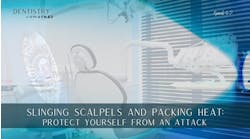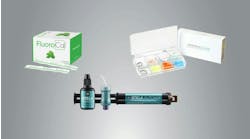Bob Frazer Jr., DDS
"Not surprisingly, a group's (i.e., dental team's) emotional intelligence (EI) requires the same capabilities of an emotionally intelligent individual: self-awareness, self-management, social awareness, and relationship management. What's different, though, is that the EI competencies relate both to each individual and the group as a whole." These are the words of Daniel Goleman, PhD, world authority on EI, author of Emotional Intelligence and Primal Leadership. So, where do you begin to elevate your practice's EI?
First, the doctor/leader must understand and then elevate his or her EI. Each of the key staff must either have been chosen in part for high EI or must be willing to raise their EI. Goleman's research — and the research of many others— points out that 75 percent of an individual's or group's (practice's) success is the result of EI, when necessary technical competencies are present. Understanding can be achieved by reading the book mentioned above or Robert Cooper's Executive EQ. But, as noted earlier in this series, simply understanding EI is not enough! The only way to elevate EI is through actual practice.
Remember, emotional responses arise out of the limbic system (primitive brain), below the level of the neo-cortex (cognitive brain). Having an emotional response, is unavoidable unless you are Mr. Spock or Data on Star Trek! However ardently some dental educators tried, they were unable to eliminate our emotions, although many of us were taught to suppress them. We learned "therapeutic distance," under the guise that it would help us remain objective and be more effective healers. The indigenous people never had such a belief; in fact, indigenous peoples the world over believe that "the healer ... pays attention to what has heart!"
I've had the mixed blessing of dealing with a life- threatening illness, and I know first-hand the power of an empathic physician and medical team. Early in my career, when I was learning how to connect with people as they entered my practice, a 65-year-old woman came to me for dental care after radiation for oral cancer. In those days, my new patient interview was somewhat clumsy, especially when it came to how I expressed my philosophy. During her first visit, while interviewing and discussing our approach, I said, "I believe people are more important than teeth." That may sound really dumb to you! But she reached out and touched my hand and said, "I've been in the medical system (at a famous cancer center) for some 24 months. During that time, I've been treated by at least 50 physicians. I have felt like a pawn in the medical system. All that time, I've been referred to as an interesting squamous cell carcinoma or a particularly complex oral cancer. Isn't it ironic that it is my dentist who is the first to show humanity to me!" Wow, if I ever believed in therapeutic distance, it vanished that day as I tried to understand what it must have been like to have been objectified and not acknowledged as a whole person. I'm sure her feelings ranged from fear, to hopelessness, to uncertainty, to discouragement, to feeling utterly alone.
Author and pediatric oncologist, Rachel Naomi Remen, MD, has said, "To treat whole people, we must be present as whole people!" So, to be more whole, begin by becoming more aware of your emotions and those of others. Then, learn how to manage emotions toward positive outcomes. This is best accomplished through daily practice. You can learn to rewire your neurological circuitry by working with experts such as counselors or psychologists, particularly those trained in family-systems therapy, because most of our emotional-response pathways were laid down in childhood.
Your office can participate in practical workshops with 75 percent or more of the program as hands-on scenario experiences where you practice real-life situations, learning how to respond in different, more emotionally-intelligent ways. Another simple, effective tool is journaling at the end of the day or week, reflecting on the events, how you felt and responded, and how you might respond differently the next time. Tape- recording (video if possible) your dialogue gives you an opportunity to see how well you listen and respond to the emotional cues. Finally, Goleman's research shows that a long-term coaching relationship, where you examine your behavior regularly with an objective observer, is one of the most effective ways to elevate your E.Q. In our work we've seen some extraordinary results, but you must act.
Dr. Bob Frazer Jr., FACD, FICD, is founder of R.L. Frazer & Assoc., whose custom programs help dentists achieve top 5 percent status in financial achievement and life balance (fulfillment with significance). Thirty-one years of quality practice and superb communication skills have propelled him to a 28-year international speaking career. For information on his upcoming "New Patient Experience for the Values-Driven Practice Practicum," 1/27-29/2005, or a new audio/CD series, How To Build the Exceptional Life and Practice, contact him at (512) 346-0455, fax (512) 346-1071, or email him at bob@frazer online.com. Visit his Web site at www.frazeronline.com.





